Ab e Country.
There was a meeting of the working classes at Plymouth on Mon- day. According to a Tory statement, the numbers present amounted to two thousand persons; but we have as yet seen no account of the proceedings.
The working classes of Macclesfield had a meeting on Monday, to petition for the People's Charter ; and a similar meeting was held at Stockport the next day. The numbers assembled at each place amounted to several thousands. There was no new feature in the proceedings. Mr. Feargus O'Connor and Mr. Stephens were the chief speakers.
A meeting was held in the Manor Court-room, Manchester, on Monday night, Mr. Brotherton in the chair, for the purpose of esta- bliehing an institution which was to be distinguished by the appellation of " The Parthenon, or Working Man's University." The object of this institution was " to supply the working man with that kind of knowledge which, while it would elevate him in intellect and circum- stances, should at the same time make him a more valuable member of sentry." After several speeches had been made in favour of such an institution, the harmony of the meeting was disturbed by the entrance eta party of Radical agitators, who had just returned from attending a " demonstration " at Macclesfield. The foremost of these was a shoemaker named Hunt ; who declared that the people did not want knowledge, but a more equal distribution of property, and that so long as they received such low wages, and were kept at work so long, they could neither fend money nor time to spend in such as institution as was pro- posed. A scene of confusion took place, in consequence of Mr. Bro- therton interfering to stop the speaker ; but the Universal Suffrage men were too powerful to be silenced, and ultimately succeeded in ejecting Mr. Brotherton from the chair and in carrying resolutions fa- vourable to their own views.—Courier.
At a meeting of the Council of the Birmingham Political Union, last week, Mr. Douglas, one of the deputation from Birmingham to tke Lancashire and Cheshire gathering on Kersal Moor, gave an acs went of the proceeding thereat, and especially referred to the " vexed question " of the numbers assembled. Mr. Douglas said- " There were very large detachments of men from a distance. There was one detachrnent of considerably more than ten thousand men, from a distance of many We,. That circumstance alone expressed a strong spirit of determination on the pan of the people ; and it indicated that they had not only determioation, but Raab auseles and sinews into the bargain; for he could tell them that it was no joke to walk rsn or twelve miles to a meeting, and, after standing there five or sis kairs, to walk the same road back again. The ground where the meeting tusk place, was about three and a half miles distant from the point where the Pfeension started. It would give them same idea of the magnitude of the pl,esaion to say, that every man who was going to the meeting joined in it. wait then in Birmingham it was different—their processions seldom contained mote than from four to five thousand men ; in Manchester, in this respect, they manage those things better. When Mr. llichardsvo, the marshal of the procession, came to the meeting, he stated tl a head of the column was at the tollgate, about half a mile off, while the tail was still in the town ; the coltimn came rolling over the brow of the hill, like one of those sea serpents which the Americans used to be so fond of telling them about. To describe the meeting itself was beyond his power ; it made one's heart more than glad to look upon. it ; it altogether astounded the beholder. The nature of the ground was very similar to that at Holloway Head, but of twice the extent. If, then, they could fancy a space of ground twice as large as that of Holloway Head, covered with men as thick as the day when they met at Holloway Head,—and if, in.. stead of the two or three thousand in the rear of the hustings on that occasion, they could fancy an extensive race-zoluse covered by at least twenty-five thou- sand men,—they would entertain a tolerably con ect notion of the Manchester meeting. The number present had been calculated at three hundred thousand ; but it was very difficult to form a correct estimate of such a meeting as it %vat. He thought at haltpast three o'clock, after a very great number of men, who were neither able to see or hear, had returned to town, that there still remained one hundred thousand. Mr. Salt arrived from Liverpool at two o'clock. He met the people returning from the meeting in so great numbers and in so con- tinuous a stream, as he came from Manchester, that be had some difficulty in making his way through them. Mr. Douglas had had some conversation with an opulent manufacturer, almost the only man of the middle classes, with the exception of the l'ieldena,"who bad joined the People. That gentleman had seen all the gloat meetings that had taken place in Manchester and Lancashire; he bad witnessed all the meetings on the great race.dava, which brought to- gether all parties and all classes of men, lords, squires, Wiligs, Tories, Radical; true men, and rogues; and he had never seen the most crowded race-day at- tended by such masses as were at the meeting on Monday."


























 Previous page
Previous page